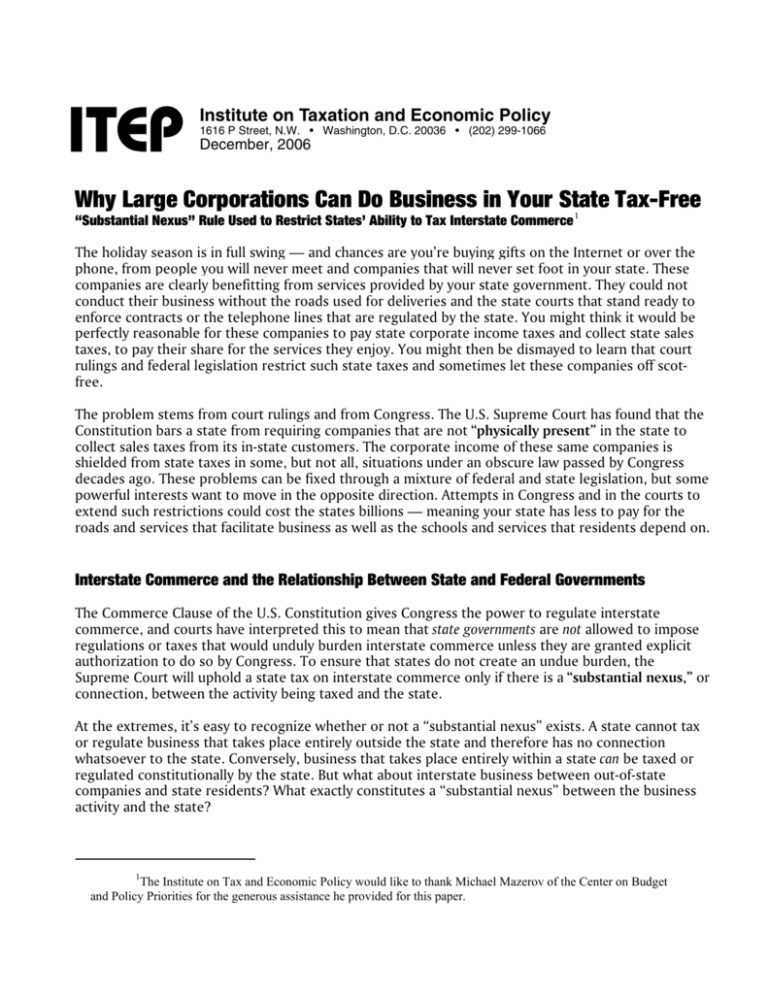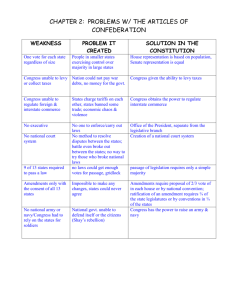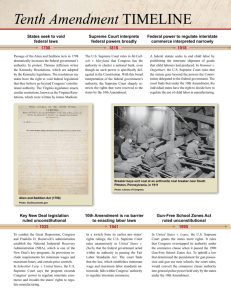Why Large Corporations Can Do Business in Your State Tax-Free
advertisement

ITEP Institute on Taxation and Economic Policy 1616 P Street, N.W. • Washington, D.C. 20036 • (202) 299-1066 December, 2006 Why Large Corporations Can Do Business in Your State Tax-Free “Substantial Nexus” Rule Used to Restrict States’ Ability to Tax Interstate Commerce 1 The holiday season is in full swing — and chances are you’re buying gifts on the Internet or over the phone, from people you will never meet and companies that will never set foot in your state. These companies are clearly benefitting from services provided by your state government. They could not conduct their business without the roads used for deliveries and the state courts that stand ready to enforce contracts or the telephone lines that are regulated by the state. You might think it would be perfectly reasonable for these companies to pay state corporate income taxes and collect state sales taxes, to pay their share for the services they enjoy. You might then be dismayed to learn that court rulings and federal legislation restrict such state taxes and sometimes let these companies off scotfree. The problem stems from court rulings and from Congress. The U.S. Supreme Court has found that the Constitution bars a state from requiring companies that are not “physically present” in the state to collect sales taxes from its in-state customers. The corporate income of these same companies is shielded from state taxes in some, but not all, situations under an obscure law passed by Congress decades ago. These problems can be fixed through a mixture of federal and state legislation, but some powerful interests want to move in the opposite direction. Attempts in Congress and in the courts to extend such restrictions could cost the states billions — meaning your state has less to pay for the roads and services that facilitate business as well as the schools and services that residents depend on. Interstate Commerce and the Relationship Between State and Federal Governments The Commerce Clause of the U.S. Constitution gives Congress the power to regulate interstate commerce, and courts have interpreted this to mean that state governments are not allowed to impose regulations or taxes that would unduly burden interstate commerce unless they are granted explicit authorization to do so by Congress. To ensure that states do not create an undue burden, the Supreme Court will uphold a state tax on interstate commerce only if there is a “substantial nexus,” or connection, between the activity being taxed and the state. At the extremes, it’s easy to recognize whether or not a “substantial nexus” exists. A state cannot tax or regulate business that takes place entirely outside the state and therefore has no connection whatsoever to the state. Conversely, business that takes place entirely within a state can be taxed or regulated constitutionally by the state. But what about interstate business between out-of-state companies and state residents? What exactly constitutes a “substantial nexus” between the business activity and the state? 1 The Institute on Tax and Economic Policy would like to thank Michael Mazerov of the Center on Budget and Policy Priorities for the generous assistance he provided for this paper. The answer differs depending on the type of tax. Here we examine two types of taxes, sales taxes and corporate income taxes, to see what rules apply to each. Under current interpretations of the Commerce Clause, the “substantial nexus” required to justify imposition of a sales tax is the “physical presence” — that is, property or employees — of the company in the state. While the U.S. Supreme Court has not applied the same rule to corporate income taxes, Congress has done so for certain types of income. Sales Taxes In Complete Auto Transit v. Brady (U.S. 1977) the Supreme Court held that a state could not require an out-of-state company to collect sales taxes from customers in the state unless certain requirements were met, including a “substantial nexus” between the company and the state. In Quill Corporation v. North Dakota (U.S. 1992) the Court clarified that this substantial nexus required a “physical presence” of the company in the state. Part of the reasoning behind this standard is the alleged burden that would be posed by forcing companies with nation-wide sales, but no physical presence in most states, to collect sales taxes that differ in every jurisdiction. Besides the states and the District of Columbia, thousands of localities can and do impose sales taxes using different rates and covering or excluding different types of sales. The physical presence standard has caused some serious problems. First, state governments lose the revenues that they would otherwise collect on sales. To be sure, remote sales can still, in theory, be taxed by the state in which the purchaser resides. Every state with a sales tax currently levies a tax that purchasers (rather than sellers) are supposed to pay on their otherwise untaxed purchases. But in practice, such taxes are difficult to enforce and are rarely paid by individuals. The second problem is that in-state businesses are put at a competitive disadvantage compared to remote sellers. Two companies may sell the exact same product, but the one that sells from out of state through mail or the Internet and has no physical presence in a state has an advantage over an instate company selling the same product (even over the Internet) because only the latter has to collect sales taxes. A third problem is that the physical presence standard also probably results in more regressive state tax systems, particularly as it pertains to Internet sales. The physical presence standard gives tax breaks to people who do much of their shopping online, which may include more high-income people. Efforts by States to Bypass the Restrictions Imposed by the Physical Presence Test In the fourteen years since the Quill decision, the physical presence standard has become more of a drain on state tax revenues. Internet sales in particular have increased the amount of commerce that takes place through remote sales and is therefore off-limits to state sales taxes. But fortunately, the U.S. Supreme Court has suggested a strategy that would close this loophole. The Court in Quill suggested that Congress could enact legislation allowing states to tax remote sales, and hinted that Congress would be more willing if states first took steps to simplify the current confusing system of varying state tax bases and tax rates. The states have collectively responded to this suggestion that they cooperate to simplify their sales tax rules. The Streamlined Sales Tax Project (SSTP) was formed by representatives of most of the states for this purpose in 2000. In 2002 they agreed on model legislation under an agreement called the Streamlined Sales and Use Tax Agreement (SSUTA). However, even states that have enacted this legislation cannot impose sales taxes on remote sales until Congress passes a law allowing them to do so. So far Congress has not done so and there are members on both sides of the aisle who seem determined to shield Internet commerce from taxation. Corporate Income Taxes Regarding state corporate income taxes (or other types of “business activity” taxes such as gross receipts taxes), the U.S. Supreme Court has never said that companies must be physically present in the state to be subject to such taxes. Instead, Congress has imposed a physical presence test for state taxes on business income from the sale of physical goods, but not for other sales (like the sale of services). Specifically, in 1959, Congress enacted Public Law 86-272 prohibiting states from taxing the income of a companies’ sales of physical goods if the company sells products to people in the state but ships them from out-of-state and takes the orders at an out-of-state location. This definition of physical presence leads to some strange results. For example, say a company takes orders from a location in State A and ships its products from State A. It could sell 90 percent of its products to customers in State B and send hundreds of trucks and thousands of salespeople into State B but it still can’t be taxed by State B. Another indefensible result of the “physical presence” standard is that some corporate income is never taxed at all. For example, in the above scenario, it’s possible that neither State A nor State B will have the authority under Public Law 26-272 to tax the income made on the sales by the company, and hence it can be called “nowhere income.” About half the states with corporate income taxes solve this problem with a “throwback rule.” This simply says that the state will tax any income on sales from its companies to other jurisdictions if they are not taxed in those jurisdictions, essentially “throwing back” the income to its state of origin. In other words, State A in the example above could tax the income from the sale of goods sold to residents of State B. While this solution provides a patch for the state tax and revenue system in those states that use it, Public Law 26-272 is nonetheless an onerous law that ultimately should be revisited by Congress. A Legislative Attempt to Further Restrict State Taxation of Interstate Commerce Using the Physical Presence Test While the physical presence standard already applies to all state sales taxes (as a result of court rulings) and some state corporate income taxes (as a result of Congressional action), attempts have been made to expand the rule’s reach to shield even more corporate income. Unfortunately, some members of Congress want to expand it to cover the sale of services and other types of sales by out-ofstate companies with the misnamed Business Activity Tax Simplification Act (BATSA). This would result in a major tax break for multi-state businesses while actually complicating the law governing state corporate income taxes. Applying the physical presence standard to all sales may seem, at first blush, like a step towards simplification. But, as argued by Michael Mazerov at the Center on Budget and Policy Priorities, simplification is the last thing this law would accomplish.2 BATSA takes the law enacted in 1959 that currently covers physical goods shipped from out-of-state and extends it to cover other sales and then writes in several loopholes to shield a lot of corporate profits from state taxes. The basic idea sounds deceptively simple. The income of a company doing business in a particular state can be taxed only if it has a “physical presence” in that state for more than 21 days out of the tax year. But the bill contains many “safe harbors” — exceptions basically. For example, a manufacturer could ship unfinished products into a state to have them completed and then shipped back out without triggering the physical presence rule. Or a company that sends service people into a particular state can create subsidiaries that go into the state for no more than 21 days each to avoid meeting the rule’s physical presence threshold. Companies could maneuver to avoid paying taxes in states where it is clearly doing business. BATSA is an attempt to expand the physical presence standard at a time when Congress ought to be moving in the opposite direction by revisiting the law that applies it to the sale of goods. States should be free to consider all the ways in which businesses can make money in a state — even without being “physically present” there. To determine whether income from sales not covered by Public Law 26-272 can be taxed, some states use an “economic presence” standard that is described below. BATSA would trade this freedom of the states for a major tax break for multi-state corporations. An Attempt Through Litigation to Further Restrict State Taxation of Interstate Commerce Using the Physical Presence Test While the U.S. Supreme Court has never said the U.S. Constitution requires state corporate income taxes or franchise taxes to meet the physical presence test, some business interests are working to obtain such court rulings. The highest court in West Virginia recently rejected such an attempt in West Virginia Tax Commissioner v. MBNA America Bank (W.V. 2006). MBNA, a Delaware corporation issuing credit cards to customers in several states through mail and telephone solicitation, argued that because it had no physical presence in West Virginia, there was no substantial nexus between the company and the state, even though West Virginians had been issued credit cards by MBNA. 2 Michael Mazerov. Proposed “Business Activity Tax Nexus” Legislation Would Seriously Undermine State Taxes on Corporate Profits and Harm the Economy. Center on Budget and Policy Priorities. http://www.cbpp.org/9-14-04sfp.htm The Court disagreed, finding that the physical presence standard spelled out in Quill does not apply to corporate income taxes and franchise taxes. Among its reasons, the Court found that part of the rationale behind the Quill decision was the burden presented by collecting sales taxes for thousands of jurisdictions and that payment of taxes on a company’s income did not pose as great an administrative burden. A More Workable Alternative: An “Economic Presence” Test The West Virginia court endorsed an alternative to the physical presence test called the “economic presence” test. The common-sense observation behind an “economic presence” standard is that in the Internet age, multi-state companies can routinely do millions of dollars in business in a given state without ever having a physical presence there — and that there needs to be a way to define the threshold level of business activity above which these companies should be taxed by each state. Details for such a test have been developed by the Multi-state Tax Commission. The test looks at the sales, property and payroll a company has in a given state. A company is “economically present” in a state and can be taxed if the sales are at least $500,000, or the property value or payroll exceeds $50,000, or if 25 percent of the company’s sales, property or payroll are in the state. The proportion of the income taxed by the state is based on the percentage of these three factors in the state. This makes more sense than the “physical presence” standard. The three factors represent the various ways a company can be economically “present” in the state and therefore benefit from the services the state provides, such as roads that enable the products to be shipped, schools that educate the workforce, police that protect the company’s property and so forth. So far only Ohio has adopted this approach entirely but other states are considering it.3 Another benefit of the “economic presence” standard is that it does not discriminate in favor of large multi-state companies and against small locally-owned businesses. Under the physical presence standard, large multi-state companies have opportunities to avoid taxes that smaller home-grown companies do not enjoy, regardless of which carry out a more productive business in the state. Most people would have a hard time understanding why out-of-state companies trying to sell them services should receive tax advantages denied to locally-owned businesses in their neighborhoods. Conclusion Services that states provide, like roads, schools and healthcare, can be harmed if a large portion of interstate commerce escapes state taxes. Restrictions on states’ ability to tax or regulate companies that are not “physically present” in the states where they earn profits will continue to lead to this result as remote sales become a larger part of commerce. Under the U.S. Supreme Court’s interpretation of the Commerce Clause, states cannot impose state sales taxes on these companies unless allowed by Congress (something one can hope Congress will do by implementing the SSUTA). While the U.S. Supreme Court has not spoken clearly on the standard applicable to state corporate income taxes, many state courts have found that states can impose corporate income taxes on companies’ remote sales income unless Congress steps in to prohibit it — and Congress has prohibited 3 Statement of Dan R. Bucks, Director, Montana Department of Revenue Before the Senate Subcommittee on International Trade, July 25, 2006. http://www.senate.gov/~finance/hearings/testimony/2005test/072506dbtest.pdf it insofar as such taxes concern the remote sale of physical goods. The Supreme Court’s restriction on state sales taxes and Congress’s restriction on some state corporate income taxes have hurt the states fiscally and have had uneven and unfair effects on businesses and consumers. Given this situation, several steps can be taken to improve the effectiveness of state taxes on interstate commerce. First, Congress should end the use of the physical presence standard for state sales taxes by responding positively to the states’ sales tax simplification efforts (SSUTA). Specifically, Congress should enact legislation that allows states to levy sales taxes on sales from out-of-state companies. This will the undo the unfair and expensive consequences of the Quill decision on the states, consumers and small businesses. While some in Congress seem determined to shield Internet commerce from taxation, there are others from both parties who have shown interest in such legislation. Second, Congress should revisit Public Law 26-272, the antiquated law passed in 1959 that restricts states’ ability to tax the corporate income of out-of-state companies when it is generated from the sale of physical goods. The physical presence standard is simply too high a hurdle to a fair tax system. Third, Congress should reject any attempt to extend the physical presence standard in Public Law 26272 to reach corporate income generated by other types of sales. Letting state governments continue to use the “economic presence” standard will better allow states to fairly spread the costs of paying for the services that benefit business as well as state residents.








